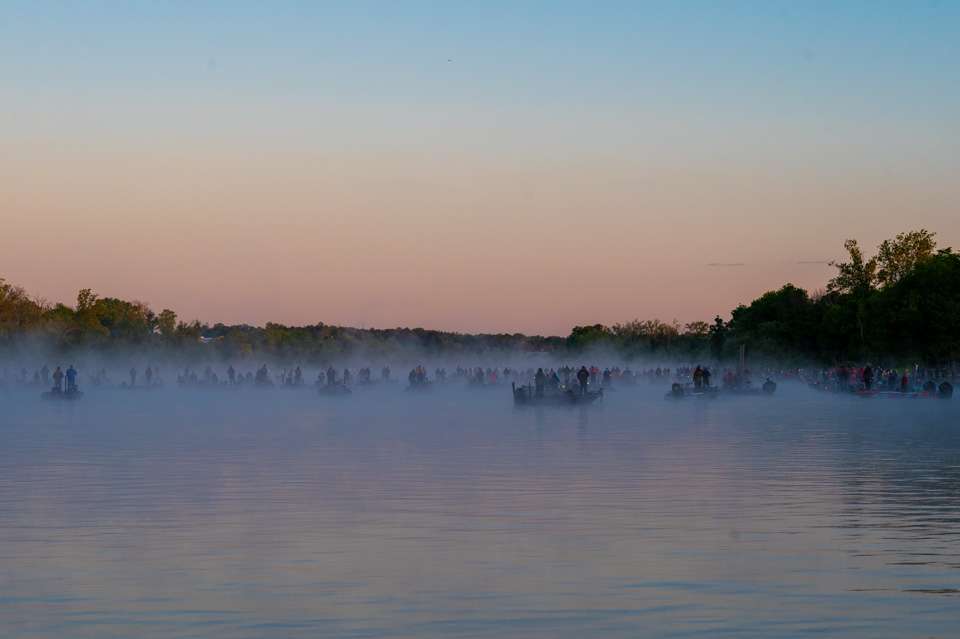
Richmond, VA – Last year at this time, stores couldn’t keep toilet paper in stock, but this week the most popular item to hoard seems to be gasoline. For some anglers competing in the Basspro.com Bassmaster Open at the James River, the disruption to the Colonial Pipeline required some change in strategy or attitude. Unlike last year, when you could likely find someone to “spare a square” or suggest a reasonable alternative, every boat in this week’s field requires processed fossil fuels to operate.
Gas management has long been a portion of tournament planning. Will you have enough fuel to get there and get back? Is there a place to fill up on the water? Some anglers claim to know tricks to make sure that every square inch of their gas tanks are full, while others purposely run their boats “light” to get into backwater areas or gain an edge in speed. Still, sometimes it requires a miracle to bring the proper ending into sight. Heading back to weigh-in at the 2015 Elite Series event on the California Delta, eventual winner Justin Lucas ran out of fuel, but he and his fish were safely transported in the nick of time by a fellow competitor.
In earlier days, necessity was the mother of invention. Today former Elite Series pro Charlie Hartley recalled a tournament on the Mississippi River that required long runs but offered no on-the-water spots to refuel. Some competitors stored gas cans on the bank, while others, including Hartley, brought extras in their boats.
“We were using bungee cords to hold them down, but they still flew around like a rocket ship,” he said. “And let me tell you, an empty can is just as big of a pain as a full one. In that tournament Tommy Biffle had a metal one 10 inches tall attached to the rear deck of his boat.” Eventually, most major trails made those practices and add-ons against the rules. Today you can stop and get gas, but you must use the factory-installed tanks alone to store it.
“But I never thought of the possibility that the gas stations would run out,” Hartley continued. Indeed, after making a long run today he got gas from a marina whose owner asked whether he was staying in their adjacent hotel, to which he answered, “Yes, sir,” even though that might not have been strictly the truth. Connecticut pro Terry Baksay filled up at that same marina – then under different ownership – in the 1990 Bassmaster Classic and he recalled that “you had to pay with cash.” Those Classic boats held far less fuel than the vessels most of the field are piloting this week. That’s good when you’re on the water, but may breed some resentment. This week Baksay waited in line for two hours to fuel up, and suffered not only nasty looks from his fellow shoppers, but also a few pointed comments aimed at the thirsty boat in line amongst commuters and carpoolers.
Even if they don’t go far as the crow flies, competitors still need to be mindful of how much gas they actually burn. New Jersey pro Pete Gluszek said that he fished a five-mile stretch of water today, but might have piloted his boat a total of 50 miles within that span. Indeed, both the highways and the waterways might be jammed with broken heroes if they don’t plan properly.
That was the concern of Andrew Upshaw and the fellow Oklahomans Matt Pangrac and Bradley Hallman who he travels with. Prior to the event, Upshaw expressed his concern on social media about the lack of fuel availability, and today he said that “it definitely made us think a little more about it and to put some contingencies in place.” Those included fishing relatively close to the take-off site for a portion of practice and skipping practice on Wednesday “just to save gas.”
While numerous stations in the tournament region seem to have gasoline now, and the long lines and hoarding of a few days ago have mostly subsided, the fuel issue remains – pardon the pun – a fluid situation. Virginia angler Nicholas Bodsford, who lives nearby, said that the station where he usually fuels up had two tankers show up yesterday, but they had nothing to sell when he arrived at 3am today. Today he burned almost half of the 53 gallons that his boat holds. “I could realistically do it without filling up tomorrow, but I’d be running on fumes. But I wasn’t going to change the way I practiced or fished.”
While most competitors are at the mercy of the market, former tour pro Mike Hicks, who sits in 3rd on the pro side with 18-13, has an ace in the hole – his family heating and air-conditioning business has its own fuel tank, “and we just got 500 gallons.” Despite that abundance, which he said he might share with a few friends, he’s not making a terribly long run. If he wins, that irony will just add fuel to the fire of his competitors’ jealousy.

